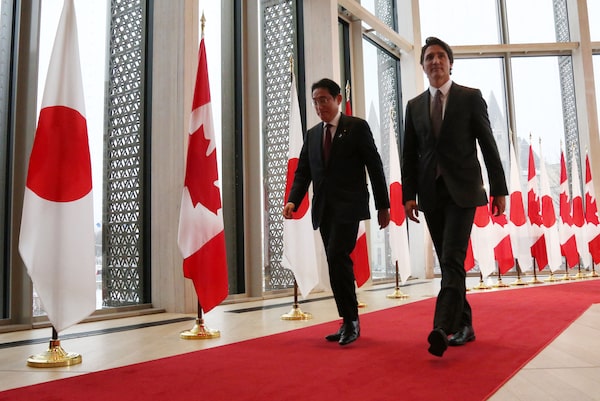
Japanese Prime Minister Fumio Kishida and Prime Minister Justin Trudeau walk together after a news conference, on Jan. 12, in Ottawa.DAVE CHAN/AFP/Getty Images
Sasayama Takuya is the consul-general of Japan in Toronto.
This is the Year of the Rabbit, according to the Eastern zodiac, and fittingly, Japanese Prime Minister Kishida Fumio’s trip to Ottawa in January ushered in an energetic leap forward for Japan-Canada relations. The visit reaffirmed how the two countries are important strategic partners in the Indo-Pacific and share values regarding freedom, democracy, human rights and the rule of law. Canada announced its own Indo-Pacific strategy last fall, and Mr. Kishida’s visit took place with this in mind.
Japan currently holds the G7 presidency and will host a number of ministerial meetings this year, including the Hiroshima Summit in May. There is already a Japan-Canada Action Plan that contributes to a “free and open Indo-Pacific,” and continued co-operation is more important than ever in maintaining and strengthening our rules-based international order. This is the year to double down on this vital partnership, and concrete developments toward this end are already taking place.
This month, Japan’s BASC (Battery Association for Supply Chain) is visiting Ontario and Quebec. Canada is set to become a hub for EV battery supply chains, while its mining industries, combined with Japan’s advanced technologies, are expected to bring about exciting developments for EVs. In fact, ahead of BASC’s visit, Minister of Innovation, Science and Industry François-Philippe Champagne travelled to Japan three times last year. Minister of Natural Resources Jonathan Wilkinson also visited in January. Based on such a solid foundation, I sincerely expect BASC’s mission to be a fruitful one.
Meanwhile, LNG Canada is expected to start operations by the middle of this decade, contributing to both energy security and decarbonization. Both Canada and Japan should also work to fortify the supply of nuclear energy, while hydrogen and ammonia also appear promising. I look forward to greater co-operation between the private sectors of our countries to realize all such potential.
Japan and Canada also face common challenges, such as our aging societies and infrastructures. Ontario Minister of Infrastructure Kinga Surma visited Japan in January and inspected our country’s railway system, with its TOD (Transit-Oriented Development) and TOC (Transit-Oriented Communities) programs, which aim to ensure the development of vibrant, mixed-use communities around transit stations. With Japan’s declining birth rate and aging population, our railways are seeking ways to manage their operations without relying on fare revenue. This is reflected in the concept of ekinaka, community development centred on train stations, which is also worth considering in Canada. The Minato Mirai district of Yokohama used to be a shipyard, but detailed planning has transformed it into a spectacular waterfront. We hope it also might serve as an inspiration for community development in Toronto.
Ontario Agriculture Minister Lisa Thompson also visited and attended more than 20 meetings in Japan supporting various sectors and major retail companies. Japan traditionally imports vast amounts of food resources from Canada – for example, soybeans, which enhance dining room tables as natto, a delicacy made by fermenting the beans. HyLife Foods has been exporting high-quality pork from Manitoba and even operating a restaurant in Tokyo – another success story. Potash from Canada is also indispensable to Japanese agriculture. Strengthening critical supply chains for food security is therefore of paramount importance for both countries.
Furthermore, the Japanese cuisine boom in Canada shows no sign of waning, and the same applies to sake and Japanese whisky. Japanese food ingredients require meticulous and careful transportation, so building and strengthening the cold chain, to manage the temperatures of perishable products in transport, are also essential to our food trade.
Japan and Canada are key members of important economic frameworks for the Indo-Pacific, including the Comprehensive and Progressive Agreement for Trans-Pacific Partnership. The leadership assumed by both countries in the protection and development of free trade will continue to be invaluable. It is against such a backdrop that Canada will send an economic mission to Japan in the fall. Readers of this paper may recall that, in 1999, then prime minister Jean Chrétien headed a large delegation of 250 people on a similar mission. Many provincial ministers are also planning to go to Japan this year, while Quebec announced its own Indo-Pacific strategy ahead of the federal government.
Thus, this year we look forward to the visit to Japan by “Team Canada 2.0,″ comprising federal and provincial governments. The 3,000 Sakura trees planted in Ontario through our Sakura Project will be blooming again this year. Japan and Canada, celebrating the 95th anniversary of our diplomatic relations, are also about to enter a new season of splendour.